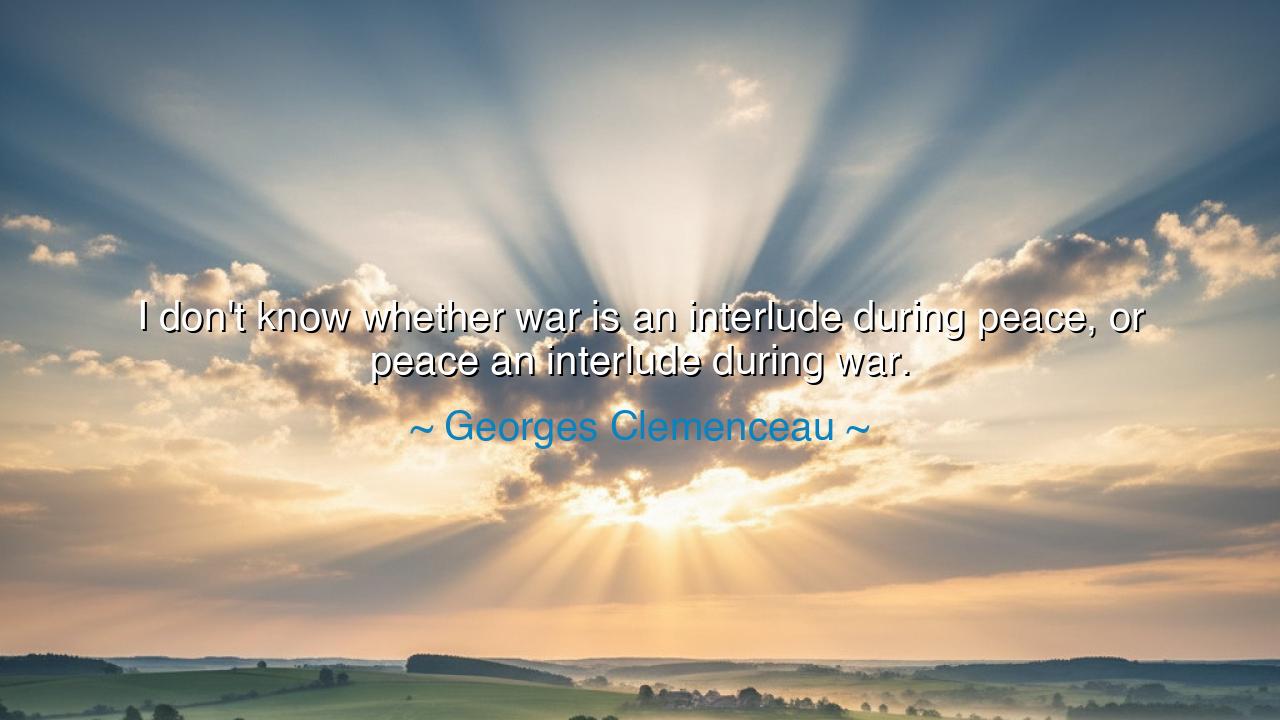
I don't know whether war is an interlude during peace, or peace
I don't know whether war is an interlude during peace, or peace an interlude during war.






The words of Georges Clemenceau — “I don’t know whether war is an interlude during peace, or peace an interlude during war.” — strike with the weight of centuries of bloodshed and fleeting reconciliation. Spoken by the French statesman who guided his nation through the fire of the First World War, these words reveal the tragic paradox of human history: that mankind has never been able to dwell long in harmony, for conflict returns like a tide, sweeping away what was built in fragile quiet. Clemenceau, known as the “Tiger of France,” knew both the triumph and sorrow of leading his people through devastation, and his reflection carries the fatigue of one who has seen peace repeatedly shattered by violence.
The heart of this quote lies in its bitter question: is peace the natural state of man, interrupted occasionally by the madness of war, or is war the true constant, with peace but a brief pause, a breath between battles? The ancients wrestled with the same question. Thucydides, chronicler of the Peloponnesian War, wrote of conflict as inevitable, born from fear, honor, and interest. Yet poets and prophets in every age dreamed of peace, of swords beaten into ploughshares and of nations living without the shadow of arms. Clemenceau’s words stand at the crossroads of these two truths — the yearning for peace, and the reality of war’s persistence.
History offers countless confirmations. After the Napoleonic Wars, Europe proclaimed an era of stability under the Concert of Powers, yet within decades revolution and bloodshed erupted once more. After the “war to end all wars” — the Great War — the world promised peace, yet within a generation, the fires of the Second World War consumed millions. In this cycle of violence, Clemenceau’s question finds its haunting echo. Indeed, one might say that history itself seems to teach that peace is fragile, always temporary, while war lurks just beyond the horizon.
And yet, it is in the brevity of peace that its value shines most brightly. For just as a flower in a barren land seems more radiant, so do moments of peace in a violent world hold deep meaning. Consider the Christmas Truce of 1914, when soldiers of both sides in the trenches of World War I set aside arms to share songs, food, and fellowship. It lasted but a day, yet it revealed the possibility of peace even amid horror. This fleeting interlude demonstrated that the human spirit still yearns for harmony, even when the world is consumed by battle.
Clemenceau’s words also carry a warning: if mankind resigns itself to the belief that war is the permanent condition, then peace will always slip away. But if humanity dares to believe that peace can be more than an interlude, then the cycle might yet be broken. The struggle is not only on the battlefield, but within the heart of each generation — will we see peace as destiny or as dream? Will we nurture it as the highest good, or treat it as a fragile pause before returning to bloodshed?
The lesson for the generations is clear: peace must not be treated as a mere interlude, but as a goal to be built, defended, and cherished. Wars may arise from pride, fear, or greed, but peace requires wisdom, humility, and sacrifice. It is easier to destroy than to preserve, easier to fight than to reconcile — yet the harder path is the one that gives life. If war is the tide of history, then peace must be the dam we build together, stone by stone, generation by generation.
In practice, let each listener cultivate peace in their own sphere. Resist the small wars of daily life — quarrels, grudges, divisions. Teach children that peace is not weakness, but strength. Support leaders who value diplomacy over destruction. Remember that global wars are born of the same seeds as personal conflicts, and by uprooting them in our hearts, we weaken their power in the world.
Thus Clemenceau’s words remain a solemn reminder: humanity must decide whether it will live as a race condemned to eternal war, with peace as a passing breath, or as a people who labor to make peace the enduring law, with war the fading shadow. The choice lies not only with nations but with each of us, for the battle between war and peace begins in the human soul.






AAdministratorAdministrator
Welcome, honored guests. Please leave a comment, we will respond soon